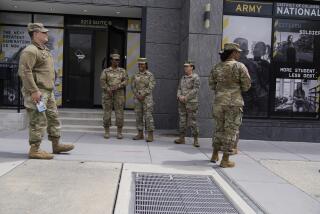U.S. Estimate of Bosnia Role Called Low : Military: Joint Chiefs of Staff chairman puts number of American troops needed for peace effort at 50,000.
- Share via
WASHINGTON — The chairman of the Joint Chiefs of Staff said Wednesday that the number of U.S. ground troops needed to enforce any peace accord in Bosnia-Herzegovina would be greater than the Clinton Administration is estimating.
Gen. John M. Shalikashvili warned against understating the number for political purposes.
He said he believes that the enforcement effort would take about 50,000 troops rather than the 15,000 to 45,000 the Administration estimates. And, he said, the United States would have to provide half that total, not merely a third, as U.S. diplomats have been saying.
His comments marked the first time that he has publicly taken issue with the Administration since taking office in October. They highlighted growing differences between the White House and the military on the most sensitive issue in the peace process.
There was no immediate reaction from the White House or State Department to the general’s comments.
The Administration floated the 50,000-troop estimate a year ago in earlier peace negotiations but has reduced the figure recently in an effort to blunt critics’ assertions that participation in peacekeeping would require a massive commitment of U.S. forces.
Undersecretary of State Peter Tarnoff has been telling U.S. allies that fewer troops might be required if the three warring factions signed a peace accord voluntarily and that Washington would be willing to supply no more than one-third of the total.
President Clinton said at a news conference last month that “all we ever said about” U.S. participation in the peacekeeping effort “was that we would expect to have less than half. We never specified a specific amount.”
But Shalikashvili told reporters Wednesday that the estimates of a year ago are still valid and warned “we must guard against sending less because we think that’s politically more salable.”
He also threw cold water on suggestions by some top Administration policy-makers that the allies should expand the threat of air strikes by the North Atlantic Treaty Organization to bring peace to other parts of Bosnia, such as Tuzla and Srebrenica. The threatened air strikes helped break the Serbian siege of Sarajevo, Bosnia’s capital.
He said Sarajevo was unusually well suited to the use of such threats because of military and political factors that do not exist in other Bosnian cities.
Shalikashvili also made these points:
* The peace around Sarajevo is still “very fragile,” and U.N. forces there must be given more troops to consolidate their gains or the situation “could get out of hand quickly.” But he said that the United States should not send ground troops until there is a peace accord.
* The military is trying to influence the negotiations for a peace agreement to avoid saddling peace enforcers with unrealistic restrictions--such as a provision in an earlier version of a peace accord that required approval by all sides just to move troops.
* NATO is prepared to send ground troops to help enforce a Bosnian peace accord within days after an agreement is signed. The bulk of any U.S. troops involved would come from American units stationed in Europe, with only a few specialized units flown from the United States. “We are very confident that the military part can be put into place quickly,” he said.
* The most important objective facing allied forces in Bosnia is “that we do not lose the balance between keeping the momentum going and overreaching.”
But he warned that the allies must also ensure that “we’re not too timid and lose momentum.”
More to Read
Sign up for Essential California
The most important California stories and recommendations in your inbox every morning.
You may occasionally receive promotional content from the Los Angeles Times.













